China's New Silk Road Must Pass Through Middle East
JERUSALEM — Three hundred kilometers by high-speed rail between the cities of Eilat and Ashdod, connecting the Red Sea coast to the Mediterranean: They call it the "Red-Med" Project.
Financed by Beijing and launched from Jerusalem, China has revealed its strategy for "West Asia" — the term that the China Shipping Container Lines company uses to delineate the area of operations between Hormuz, Suez and Haifa.
The use of the term West Asia rather than Middle East is no accident — this gives precedence to the size of the economic link with China rather than the ever troublesome geopolitics of the region.
Such is the framework that explains the activism of China's Foreign Minister Wang Yi, who has come on a flurry of trips over the past 90 days to meet with Israeli Prime Minister Benjamin Netanyahu, the Saudi Arabian crown prince, the Iranian Foreign Minister, as well as a multitude of players from the Gulf and North Africa.
West Asia is the region where more than 30 ports of various sizes and functions allow China to both import 60% of its annual requirements of oil, and export goods destined for Europe, the premier market for "Made in China;" as well as transport to and from Africa, with the presence of some one million Chinese workers and an import-export trade of $120 billion that capitalizes on every type of natural resource from agriculture to mining.
"West Asia is a region of strategic importance for China," notes Robert Lawrence Kuhn, an international banker with extensive experience in Beijing. "It allows you to import energy from the Gulf, while trading with Europe and Africa at the same time."
Wang's agenda is cautious in light of the current regional crises — the Iranian nuclear deal, Syria, and the other ongoing negotiations in the Middle East — so he prefers to devote himself to laying the groundwork for a vast economic design for the future: from the creation of an Israeli technology park in Nanxun to the reconstruction of a port in Chabahar, Iran, to the United Arab Shipping Company's decision to invest $1.4 billion to become the biggest container company in the world by tightening cooperation with the China Shipping Container Lines.
Now, there is also the Egyptian high-speed railway that will link Hurgada, Luxor, Cairo and Alexandria.
As explained in a recent study by the Center for Research in International Affairs in Herzliya, the Chinese focus on West Asia is manifest largely in investment in infrastructure. These new ports and the high-speed rail will create an alternative transport route that could continue to operate in the event of a crisis blocking shipping in either the Suez Canal or Strait of Hormuz.
Like the U.S. protected their oil routes after the 1973 crisis with their navy, Beijing now wants to guarantee their own energy needs with a massive network of state-of-the-art railways.
This is the strategy of the "New Silk Road." It also includes the Chinese military pouring money into in high-speed lines inside the country, Beijing inking an agreement in 2010 with Tehran for an intended route through Central Asia that envisions a futuristic Orient Express within 10 years — capable of traveling from the Chinese capital to the English Channel in just two nights.
This railway will pass through at least 28 countries in Asia and Europe, extending along 81,000 kilometers from Shanghai to Nanjing at more than 350 kilometers per hour, connecting China to the commercial hub of West Asia. The Luxor-Alexandria railway is, in this context, additional infrastructure to ensure that the "Made in China" goods can access Africa, like the Eilat and Ashdod ports in the Mediterranean.
This also explains the determination with which Netanyahu wants to fast track the construction through the Negev desert, with a bill of $2 billion over five years, with work slated to begin within the next 12 months.
"It's the first time that we'll be able to help nations in Europe and Asia keep an open business channel," says Netanyahu. The prime minister has already reportedly talked with Jordanian King Abdullah about an extension to the city of Aqaba, which lies on Jordan's Red Sea coast, and would link the Saudi network with the Israeli one through Jordan.
"For China, this means that within just a few years there will be an alternative land route to the Suez Canal," says former Israeli diplomat, Oded Eran at the Center for Strategic Studies in Tel Aviv.
But China is already busy thinking of other types of infrastructure. Look at Halfaya, Iraq, where China National Petroleum Corp has a key base: A mega-residence, complete with an artificial lake and sailboats, was built for the engineers on site so that they could relax.
Source from: Worldcrunch.com














